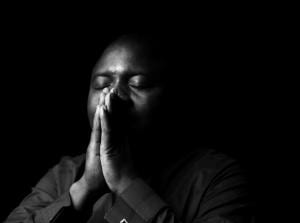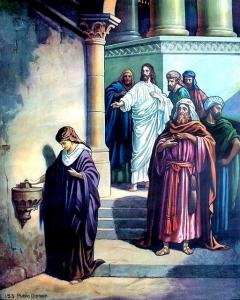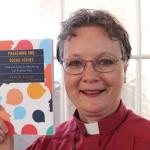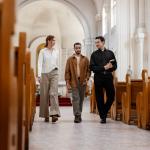Are you a pastor feeling gut-punched by the election results? Here are tips, encouragement, and sermon ideas for preaching after the 2024 election.

The aftermath of the 2024 election
Many ministers are reeling after the 2024 election. For pastors who preach about the God of love and grace, the Beloved Community of Jesus, and the Holy Spirit’s prophetic fire for justice and righteousness, the results of the election feel like a gut-punch.
With the possibility of the executive, legislative, and judicial branches all under authoritarian control, democracy is gravely threatened and has perhaps suffered a deathblow.
The incoming administration has made clear that they plan to target their political enemies with violence, carry out mass deportations, further restrict women’s rights and health, and dismantle many of our governmental institutions with Project 2025. The nightmare scenario is becoming a reality.
If you are a pastor wondering how you can get yourself together for preaching and ministry this coming Sunday and in the weeks ahead, here are tips, words of wisdom, encouragement, and sermon ideas for preaching after the 2024 election.
It’s like 20216 all over again – but worse
In many ways, this moment feels like the aftermath of the 2016 election, though undoubtedly worse this time.
Eight years ago, on Nov. 9, 2016, I had the honor of sitting with the late Rev. Dr. Dale Andrews, Distinguished Professor of Homiletics, Social Justice and Practical Theology at Vanderbilt Divinity School, as we talked students at Wake Forest University Divinity School the morning after the presidential election. We were there for the school’s Prophetic Ministry Week and were prepared to talk with them about what prophetic preaching looks like in the face of eco-racism and related issues.

But that morning as tears flowed and audible sobs were heard throughout the room, the feelings of shock, confusion, and utter despair meant that we needed to process with these theologically-trained students – some of whom were preparing for ordained ministry – what had transpired for our nation.
“For such a time as this.”
Dr. Andrews reminded the students that this is exactly why they are called to be a Christian, to preach, and to minister.
“For such a time as this,” he said, invoking Mordecai’s words to Esther when she was faced with going into a place of potential danger for herself, carrying the burden of her people’s safety in her hands (Esther 4:14). In other words, this is exactly the time when pastors and preachers are needed.
We must preach that God is still at work – even when the underhanded politics of Haman are threatening us.
After Dr. Andrews’ initial words, I reminded the students that we have the biblical and theological resources for such a time as this.
- We preach that God was already in the tomb resurrecting Jesus even after it appeared sealed forever.
- We tell our parishioners that Jesus has already gone ahead to Galilee to meet us.
- And we say that the Spirit is already at work in ways that may not yet be evident.
If we truly believe all these things, then we are called to be a pastoral presence and to use all our skills in pastoral care for reflective listening, empathy, and responsive prophetic action.
“Prophetic care”
For those brief hours, Dr. Andrews and I counseled the students on how to preach what he aptly called “prophetic care” – a pastoral care and prophetic proclamation that are inextricably fused. (See: Preaching Prophetic Care: Building Bridges to Justice.)
When pastors care for their people, they call out sin (especially systemic sin) for the way it harms individuals, families, communities, the nation, and the planet.
And when they are prophetic, it springs from their deep and empathetic – even suffering – love for God’s people.
All of this is done, he explained, in the spirit of bridge-building – seeking ways to span the seemingly uncrossable polarizations between people of different political orientations, religions, races, ages, genders, physical/mental abilities, and socioeconomic strata.
Dr. Andrews’ teaching helped us understand that the pastoral and prophetic are both interdependent and arising from each other. Prophetic care encompasses the dual callings of confronting sin while also extending loving concern.
Now, here we are eight years later.
We are facing an onslaught of authoritarianism without any of the guardrails that had kept the train of democracy from completely falling off the track the last time this administration was in power.
How are we supposed to go into our churches on Sunday morning, knowing why lies ahead? What are we supposed to say and do? How are we going to endure the pain of those who are devastated by the outcome, even as we ourselves are traumatized?

What does it look like to be church in the midst of all this?
Our task is not new, but has added urgency
I wrote in a recent article that regardless of the election’s outcome, the mission of the church has not changed. God is still at work in the world, despite our political divides. We must remind our congregations, and ourselves, that just as Jesus continued his ministry of teaching, feeding, and healing – regardless of who was in power – so must we.
As my colleague and co-founder of the Clergy Emergency League, Rev. Stephen Fearing, said in conversation about this moment: Our work in ministry doesn’t change. Certainly, the urgency with which we do our work has increased. And the way we organize will shift. But the core of who we are as the church and the ministry of discipleship to which we are called is the same.
With that in mind, I want to offer some ideas for preaching after the 2024 election, especially for this Sunday, Nov. 10.
If you preach from the Revised Common Lectionary
Two of the assigned texts for this Sunday are 1 Kings 17:8-16 (the story of Elijah and the widow of Zarephath) and Mark 12:38-44 (the widow’s mite).
[If you don’t use the lectionary or are looking for other biblical passages and core messages for preaching after the 2024 election, check out this article: 4 Faithful Post-Election Messages for Clergy & Congregations.]
While many preachers use the story of the widow’s mite in stewardship sermons, it’s not intended to be a story about giving to the church at all. Focusing on the widow’s generosity ignores or leaves out the verses just prior to her offering.
In Mark 12:38 – 40, Jesus says this:
Beware of the scribes, who like to walk around in long robes, and to be greeted with respect in the marketplaces, and to have the best seats in the synagogues and places of honor at banquets! They devour widows’ houses and for the sake of appearance say long prayers. They will receive the greater condemnation.
Jesus draws attention to the one person no one is noticing – the widow.
Yes, she gives all she has. But it isn’t right that such a system exists whereby she is left with nothing but her last coins.

Those who suffer from economic violence in our own time will face even more hardship when the new administration comes to power. They will be the hardest hit by when the policies and systems impose even more austerity measures than they already endure.
But a sermon about the widow’s mite should not portray her as merely a victim. If we pull a chair up next to Jesus and watch this woman, we see something else as she slams down her two coins.
The widow’s MIGHT
In this sermon, I imagined what the widow is saying in this moment:
You see this? It’s all I have left. You’ve taken everything from me.
You drove my husband into debt by hiking up the taxes on our land. You polluted our water and air with your cancer-causing industries, and now he’s dead. You’ve forced me out of my house because I couldn’t pay off the debt.
You took away my health insurance. You cut off my Medicare and Social Security. You’ve priced my medications beyond what I can pay.
And you’ve told me that I should be thankful because this is all God’s will.
You religious and political leaders are here because God put you there – that’s what you’re saying. So, I should give all I have in order to receive God’s blessings.
Well, here it is – two copper coins. You already have everything else. You might as well take this, too.
When preaching about widows after the 2024 election, we can point not just to their victimization, but also their fierce resistance to oppression and their resilience in the face of destitution.
Because when the widows band together, they have a strength and power that comes from God.
Remember, it’s the persistent widow in Luke 18:1-8 who has the tenacity – and faith – to pester the judge until she gets justice. It’s the widow of Zarephath (1 Kings 17:8-16) who has the tenacity – and faith – to feed her family and the prophet Elijah until the drought ends.
In all these stories, there are intense political divides between religious leaders, political leaders, and different tribes – just like there are today.
The 2024 election showed us exactly how stark the political divide is in this country.
But exacerbating all these divides in scripture, as well as in our time, is the disparity between those who control the community’s wealth and those who do not.
Economic violence is the problem undergirding many of our political tensions.
And here’s the thing. No matter who would have won the 2024 election, the rich would still parade in their robes. The widows remain. They still have only a jar of flour and a jug of oil. They still have only two coins.
And Jesus is still watching.
When everyone else is distracted by the big goings-on among the powerbrokers, it’s Jesus who points out the widow. It’s Jesus who draws attention to a system that leads to this level of destitution and desperation – even as the widow tries to be faithful.
Amid our political struggles, God puts the widows front and center.
Jesus pays attention to the ones who are poor, who have no social safety net, who are cast aside by economic systems that use them and abuse them – even as their leaders strut and preen, preying on their very last coins.
And with the techno-billionaires poised to take over the government of this country, all of us are about to face a tsunami of plutocracy that will decimate our already tenuous structures of the common good.
So when we are preaching after the 2024 election, we need to be very clear. God is still calling us to pay attention to the poor, the lost, the forgotten, the disenfranchised, the victims of economic violence.
God hear the widows – the poorest of the poor – loud and clear.
The Bible talks about justice for widows over 100 times. Twenty-five books of the Bible contain either instructions or stories about widows. And they all insist – if you really want God’s blessings, you better be on the side of the widow.
Elijah found that out. It was the widow who fed him. And remember, God talked to that widow before Elijah even walked into town. The widows, the victims of economic violence – they are the ones we need to listen to.
These women aren’t messing around.
They’ve been to hell and back. They’ve had to find strength when death and society and systems have tried to take that strength away. And they have God on their side.
The widows are not backing down. They’re rising up. They’re demanding justice. The widows’ MIGHT has a faith at its core that will not be moved.
So are we going to be a church that cowers and caters to the engorged technocrats and authoritarian dictators?
Or are we going to follow Jesus and defend the widows?
These are the questions that we as ministers and congregations will need to keep before us in the weeks, months, and years ahead.
In the meantime, if you’re feeling disoriented, grief-stricken, depleted, or even enraged at this moment, know that you’re not alone during this difficult time in ministry. You have colleagues ready to support you as we move into this new and dangerous era.

I encourage you to check out the Clergy Emergency League website to connect with other pastors who are committed to prophetic and courageous ministry during this time of political upheaval and Christian Nationalism.
In faith and solidarity, we will get through this together.
Read also:
The Widow’s Mite? No, MIGHT! – Justice, Power, and the Widow
4 Faithful Post-Election Messages for Clergy & Congregations
Post-Election Messaging & Preaching: Red, Blue & Purple Church Tactics
Fill Your Lamps, Church – Let’s Be Ready! Post-election Sermon
Clergy: Prepare for Post-Election Season in Mind, Body & Spirit

The Rev. Dr. Leah D. Schade is the Associate Professor of Preaching and Worship at Lexington Theological Seminary in Kentucky and ordained in the ELCA. Dr. Schade does not speak for LTS or the ELCA; her opinions are her own. She is the author of Preaching and Social Issues: Tools and Tactics for Empowering Your Prophetic Voice (Rowman & Littlefield, 2024), Preaching in the Purple Zone: Ministry in the Red-Blue Divide (Rowman & Littlefield, 2019) and Creation-Crisis Preaching: Ecology, Theology, and the Pulpit (Chalice Press, 2015). She is the co-editor of Rooted and Rising: Voices of Courage in a Time of Climate Crisis (Rowman & Littlefield, 2019). Her book, Introduction to Preaching: Scripture, Theology, and Sermon Preparation, was co-authored with Jerry L. Sumney and Emily Askew (Rowman & Littlefield, 2023).













